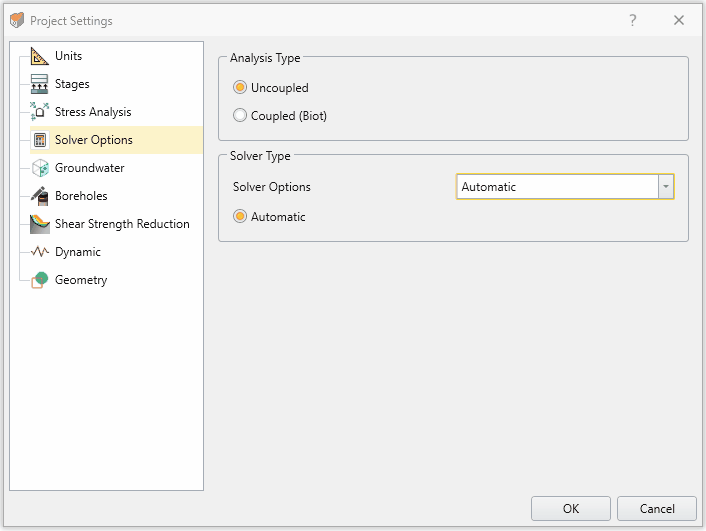Solver Options
Analysis Type
The Analysis Type refers to the interaction between fluid pore pressure and solid stresses and deformation.
UNCOUPLED ANALYSIS
The default analysis is Uncoupled (i.e. changes in pore pressure do not affect deformation and changes in loading or deformation do not affect pore pressure). This is the case for a total stress analysis (i.e. deformation is a result of changes in total stress).
COUPLED (BIOT) ANALYSIS
The fully Coupled analysis based on Biot theory, is used for time-dependent consolidation analysis problems, in which changes in pore pressure can affect deformation and changes in loading or deformation can affect pore pressure.
See the Coupled Consolidation document in the theory section for more information.
Solver Type
The Solver Type determines how Compute solves the matrix representing the system of equations defined by your model.
RS3 offers three different types of iterative solvers:
1. FGMRES + AMG Preconditioner: [Highest memory usage] Best for models with large and complex models with high degree of non-linearity
FGMRES = Flexible Generalized Minimal Residual
AMG = Algebraic Multigrid
2. FGMRES + ILU Preconditioner: [Moderate memory usage] Best for medium to moderately large models with reasonable mesh quality and
ILU = Incomplete LU factorization
3. PCG + ICT Preconditioner: [Lowest memory usage] Best for simple models with static analysis and elastic materials
PCG = Preconditioned Conjugate Gradient
ICT = Incomplete Cholesky with Threshold

Following options are available:
- Automatic - the program automatically determines from the available methods to solve system of equations (recommended).
- CPUs
- Direct: Direct solver type uses inverse matrix operation in solving system of equations
- FGMRES with AMG Preconditioner
- FGMRES with ILU Preconditioner (Suitable for computers with less than 4 cores)
- PCG with ICT Preconditioner
- Direct: Direct solver type uses inverse matrix operation in solving system of equations
- GPUs
- Direct: Direct solver type uses inverse matrix operation in solving system of equations
- FGMRES with AMG Preconditioner
Relative Tolerance and Memory Fill are two additional input parameters offered for Iterative solvers
Relative Tolerance is the numerical tolerance used when solving the system of equations (A x = b).
Since convergence is achieved iteratively, the vector of unknowns x (e.g., displacements or pore pressures) is updated until the norm of the residual (A x - b) falls below the specified tolerance. Note that this parameter is distinct from the tolerance defined in the Stress Analysis tab, which is used to check whether the global equilibrium condition is satisfied.
The Memory Fill is used to increase the memory usage for ILU or IC preconditioner. For advanced computers with abundant memory do not require re-defining this input